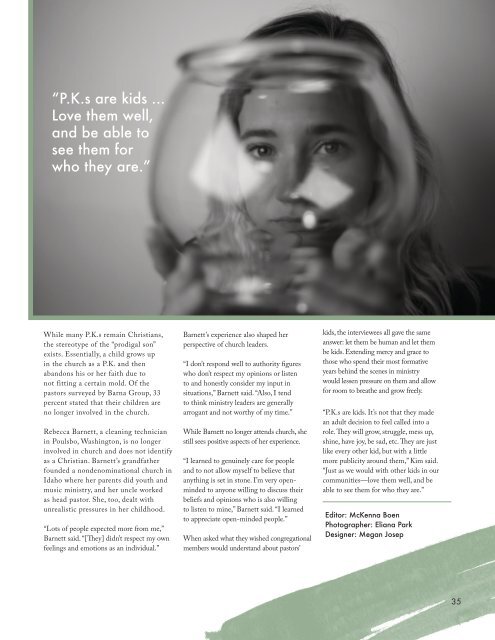The Point: Spring 2018
Spring 2018 | Volume 13 | Issue 2
Spring 2018 | Volume 13 | Issue 2
- No tags were found...
You also want an ePaper? Increase the reach of your titles
YUMPU automatically turns print PDFs into web optimized ePapers that Google loves.
“P.K.s are kids ...<br />
Love them well,<br />
and be able to<br />
see them for<br />
who they are.”<br />
While many P.K.s remain Christians,<br />
the stereotype of the “prodigal son”<br />
exists. Essentially, a child grows up<br />
in the church as a P.K. and then<br />
abandons his or her faith due to<br />
not fitting a certain mold. Of the<br />
pastors surveyed by Barna Group, 33<br />
percent stated that their children are<br />
no longer involved in the church.<br />
Rebecca Barnett, a cleaning technician<br />
in Poulsbo, Washington, is no longer<br />
involved in church and does not identify<br />
as a Christian. Barnett’s grandfather<br />
founded a nondenominational church in<br />
Idaho where her parents did youth and<br />
music ministry, and her uncle worked<br />
as head pastor. She, too, dealt with<br />
unrealistic pressures in her childhood.<br />
“Lots of people expected more from me,”<br />
Barnett said. “[<strong>The</strong>y] didn’t respect my own<br />
feelings and emotions as an individual.”<br />
Barnett’s experience also shaped her<br />
perspective of church leaders.<br />
“I don’t respond well to authority figures<br />
who don’t respect my opinions or listen<br />
to and honestly consider my input in<br />
situations,” Barnett said. “Also, I tend<br />
to think ministry leaders are generally<br />
arrogant and not worthy of my time.”<br />
While Barnett no longer attends church, she<br />
still sees positive aspects of her experience.<br />
“I learned to genuinely care for people<br />
and to not allow myself to believe that<br />
anything is set in stone. I’m very openminded<br />
to anyone willing to discuss their<br />
beliefs and opinions who is also willing<br />
to listen to mine,” Barnett said. “I learned<br />
to appreciate open-minded people.”<br />
When asked what they wished congregational<br />
members would understand about pastors’<br />
kids, the interviewees all gave the same<br />
answer: let them be human and let them<br />
be kids. Extending mercy and grace to<br />
those who spend their most formative<br />
years behind the scenes in ministry<br />
would lessen pressure on them and allow<br />
for room to breathe and grow freely.<br />
“P.K.s are kids. It’s not that they made<br />
an adult decision to feel called into a<br />
role. <strong>The</strong>y will grow, struggle, mess up,<br />
shine, have joy, be sad, etc. <strong>The</strong>y are just<br />
like every other kid, but with a little<br />
more publicity around them,” Kim said.<br />
“Just as we would with other kids in our<br />
communities—love them well, and be<br />
able to see them for who they are.”<br />
Editor: McKenna Boen<br />
Photographer: Eliana Park<br />
Designer: Megan Josep<br />
35




